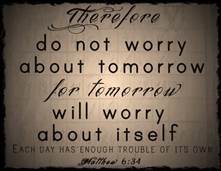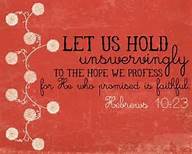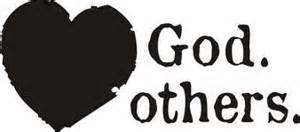“Don’t Worry?”
Matthew 6:25-34 – November 22, 2015
Worry. Fear. Anxiety. This 21st century urban culture we live in is an extremely anxious culture. People worry about all kinds of things. And, with the recent events in Paris, Beirut, and Baghdad, many people all over the world are even more anxious. For good reason!
Worry about my friends. One of my friends has an elderly parent who is in hospice. Yes, I’m concerned about the whole family! Worry about jobs. Some people worry about their bosses, or their co-workers. I have several friends who are in need of jobs, and wish they could have the luxury of worrying about the situation at work! So, there’s worry about finances in there, too.
Worry about health and about family. One of my sisters had a knee operation several months ago. She lives out of state, and I haven’t heard from her in a while. Worried? Concerned for her and her mobility? Yes, I am, at least a little.
All of these situations are troubles, concerns. Worries. The news on the radio, on the television, different media websites—all depend on worry and anxiety to pull in their viewers. And with recent events, many of the politicians worldwide are having a field day. And the media outlets? Trying to get the public on the edge of their seats, to keep tuning in, or buying their products. A never-ending fearful circus.
Here in our bible verses this morning, our Lord Jesus is telling us not to be filled with worry. Worry—anxiety—fear. When we come right down to it, this yucky predicament sounds familiar. We might not like it, we might be uncomfortable with it, but these various negative situations still happen to many of us, on a regular basis.
All the worry and anxiety just mentioned? That was mostly external. Looking outward. Yes, common to all of us. Let’s up that worry and anxiety one notch higher. Let’s sprinkle some self-centered fear on it. Add a few dashes of worry, and pile on concern about foreign people, faraway places, and strange-looking things? Does that sound familiar, too?
Fear of the interior. That’s the inside job. Your insides, my insides. Our feelings and emotions, everything all mixed together like with a blender or a kitchen mixer. I can imagine some people are so anxious and worried about what’s going on inside of them that they don’t even want to examine themselves, and do an inventory. They would far rather hide under a blanket. Or check out in other ways that involve various preoccupations or addictions. Sure, emotional insecurity is very real. Lots of people feel alone. All by themselves, and cut off from others. Bitterness and frustration can make things worse. Worry and anxiety can magnify those kind of feelings, way out of control.
The last few verses of Matthew 6 is the Gospel reading for Thanksgiving this year. Jesus preaches one of His signature sermons at the beginning of His ministry, the Sermon on the Mount. He deals with a whole bunch of topics here. The Beatitudes, the Law Code of Moses, prayer, judging others, and worry. Our reading for today. How on earth are we supposed to get thankfulness out of worry? Or not worrying? Seems like this is about gratitude’s opposite. Worry. Anxiety. Robbing our lives of peace, joy and serenity.
I have heard a good deal about worry and anxiety in the past few years. In my previous job, I worked as a hospital chaplain. Yes, I would pray with anyone who asked. But, I would also listen. As I listened, I heard about a whole lot of worry, anxiety and concern. And, rightfully so! Anxiety about upcoming treatment, worry about finances, awkward anticipation about losses of various kinds. But I would also hear about depression, anger, and self-pity. I’d hear about these painful emotions mixing and crashing around inside of people, and oftentimes, I would be helpless to do anything about it, except listen.
In personal life today, I have concerns. Sure, I have thoughts that sometimes preoccupy my mind. I can live in yesterday for too long of a time. I sometimes look forward to tomorrow—or next week or next month with some fear and anxiety. But what is the overarching message of this reading? What does Jesus tell us in this paragraph from the Gospel of Matthew?
He talks about the beauty and the vastness of God’s creation. He tells us to lift our heads and look around. Doesn’t God take care of the birds of the air and the beasts of the field? Yes, stuff happens. Life happens—and then some, at times. But if God takes care of the birds and the beasts, think about us. Think about you and me. Do you think for one minute that God would forget about you? Or, that God would forget about me?
In preparing this sermon, I found this wonderful article online. A Lutheran pastor, the Rev. Dr. Janet Hunt says this about this section of Matthew: “Somehow, sometimes, God does use the really terrible things that do happen to many of us to remind us of what is worth worrying about and what isn’t. Only in Jesus’ words today? Nothing is worth worrying about, not even the worst tragedies and struggles that are ours, for it is all in God’s hands. The big things, absolutely. And the small ones, too.”
I think some of you might have heard these little sayings: “It’s hard by the yard, but it’s a cinch by the inch.” And, “How do you eat an elephant? One bite at a time.” Anything can seem overwhelming, if we look at the whole huge thing at once. Sure, life does have challenges. And then some! However, Jesus’ words are really wise: “34 So do not worry about tomorrow; it will have enough worries of its own.” In other words, one day at a time. “Don’t worry about tomorrow!” Those aren’t my words—they’re the words of Jesus!
Some of you might be saying, “That’s all very well, to say those words. Words are pretty, but do they have any action? Do they have any lasting effect on me, on you? How does it work? In real life?” What does worry and concern do to me? To you? In real life?
One way to deal with worry and concern is to practice a breath prayer. A breath prayer has two parts: first, a name of God that fits the prayer and the second a short request for help in dealing with the problem. For example, “God, help me feel okay at the dentist.” We can say God’s name while breathing in, and the request is said while breathing out. Breath prayers can work for little worries, and big concerns, too.
Jesus says these one-day-at-a-time words from Matthew 6 to each of us, today. We can take these words home with us, today. These words urge us to let go of our worry.
Jesus offers us an amazing gift. The possibility of God’s presence, through the challenges of life. God being with us, protecting us from that worry and anxiety. Shielding us from anything that would rob our lives of peace and joy.
Praise God! God continues to help us deal with worry and anxiety, no matter how big our concerns are, or how little. Whenever and wherever they might pop up.
It seems there is nothing greater for us to be thankful for. Gratitude? You bet! Grateful to God for God’s love, protection and tender care. Here, and hereafter.
We can all say amen to that. Alleluia, amen!
Suggestion: visit me at my daily blog for 2015: matterofprayer: A Year of Everyday Prayers. and my other blog, A Year of Being Kind . Thanks!




